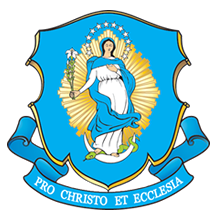
Wonder of the Annunciation
A Meditation as a Preparation for the Solemnity of the Annunciation of the B.V.M.
March 25, 2011

Both Mary and Joseph had offered themselves to God in their virginity, as Tradition and legend have it. Mary was brought to the Temple by her parents and left there to be formed as a true woman of Israel, pondering the law and the prophets. It was there that Mary met Anna, the old woman we read about in the Gospel of St. Luke (2:36) greeting Joseph and Mary when they fulfill the law by presenting Jesus in the Temple.
Mary, in prayer, was visited by Gabriel as recorded in Luke:
The angel Gabriel was sent from God to a town of Galilee called Nazareth, to a virgin betrothed to a man named Joseph, of the house of David, and the virgin's name was Mary. And coming to her, he said, "Hail, full of grace! The Lord is with you." But she was greatly troubled at what was said and pondered what sort of greeting this might be. Then the angel said to her, "Do not be afraid, Mary, for you have found favor with God. Behold, you will conceive in your womb and bear a son, and you shall name him Jesus. He will be great and will be called Son of the Most High, and the Lord God will give him the throne of David his father, and he will rule over the house of Jacob forever, and of his kingdom there will be no end." But Mary said to the angel, "How can this be, since I have no relations with a man?" And the angel said to her in reply, "The Holy Spirit will come upon you, and the power of the Most High will overshadow you. Therefore the child to be born will be called holy, the Son of God. (Lk 1: 26-35)
As we see here, Mary was astonished that she was chosen as the mother of the Messiah since she didn’t see herself as a candidate for this role of motherhood — she had humbly surrendered herself to God as a Perpetual Virgin and recognized that in human terms she could not be both virgin and mother. Still, we read a bit later in Luke 1:37 the deep truth that “nothing will be impossible with God.”
In the mysteries of God, the Church has accepted and taught that both Joseph and Mary remained as virgins and that their humble obedience brought about that which the world of Israel was waiting for centuries. Here we look and see that phenomena that always affect mankind: uncertainty, anxiety and fear. Reality seen by the human eye does not measure up to human expectations or judgments. Mary is seen as a mother, so how could she also be a virgin forever? This is why many have denied the perpetual virginity of Mary and are skeptical of the virginity of St. Joseph. Today’s society revolves many of its judgments on the basis of the sexual fixation of the times — or is it of all times when “man who trusts in human beings, who seeks his strength in flesh, whose heart turns away from the Lord? He is like a barren bush in the desert that enjoys no change of seasons, but stands in a lava waste, a salt and empty earth” (Jer 17: 5-6).
Mary sought the Lord. She pondered the scriptures and was able to ask the simple and honest question after Gabriel’s annunciation, “How can this be, since I have no relations with a man?” She equally accepted the answer with all its majestic force: “The Holy Spirit will come upon you, and the power of the Most High will overshadow you…”
Humble obedience embraced sublime truth and gave the world its Savior. So, too, may all again receive the Savior by pondering Scripture and accepting that nothing is impossible with God. May we receive within our human life the truth of our being mystical Temples of God — His dwelling place, His abode of mercy and peace.















